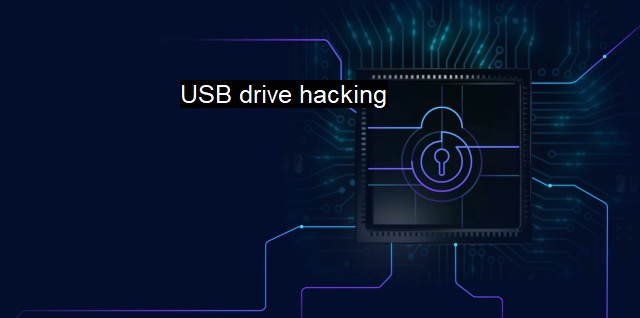What is USB drive hacking?
USB Drive Hacking: A Looming Cybersecurity Threat to Organizations and Individual Users
USB drive hacking is a term encompassing various malicious activities that hackers can implement by exploiting USB drives' connectivity with computers and other digital devices. These actions can significantly undermine cybersecurity efforts, necessitating the use of antivirus software, secure system configurations, and safe digital behaviors among users.USB drive hacking involves modifying a USB device to execute harmful codes on a computer or network when it gets connected. USB drives are common tools for data transfer, making them a covert medium for hackers to infiltrate secured systems or install malicious software. Unbeknownst to many people, a seemingly innocent act of plugging in a USB drive can initiate a major cyberattack.
The potency of USB drive hacking stems from its ability to exploit the ‘AutoRun’ feature in some operating systems. Typically, when a USB drive is plugged into a computer, the system automatically reads the files in it, executing any launch programs stored within the drive. Hackers can manipulate this feature to their advantage by loading malware into the USB drive, which then runs automatically when the drive is plugged into a computer.
Another kind of USB drive hacking involves hardware manipulation. Here, a hacker can transform a regular USB drive into a malicious device capable of mimicking a keyboard or network card. Consequently, when connected to a computer, the device can execute harmful commands or reroute network traffic to a server controlled by the cybercriminal.
The possible implications of USB drive hacking are far-reaching, varying from sensitive data theft to complete system compromise. Several high-profile cyber attacks in the past have been attributed to compromised USB drives, including the infamous Stuxnet attack, which disrupted Iran's nuclear program.
To mitigate the potential harm of USB drive hacking, multiple preventive measures can be taken. Firstly, updating operating systems and software regularly can help to patch security vulnerabilities that hackers could sometimes exploit through USB drives. Likewise, disabling the 'AutoRun' feature can prevent an automatic execution of malicious code from a compromised USB drive.
Further, antivirus solutions can play a crucial role in thwarting USB drive attacks. Antivirus software can scan USB drives upon insertion and block any suspicious files or behavior, thereby providing robust protection.
Antivirus protection can only go so far, mainly because new malware strains are developed every day, and some may bypass the antivirus’s detect-and-defend mechanism. Thus, user behavior also plays a significant part in countering USB drive hacking. Users are advised to only plug in USB drives from trusted sources and, if feasible, always maintaining backups of important data.
Organizations can employ several measures against USB drive hacking, which includes policies controlling the use of removable storage devices or implementing data loss prevention software. Installing intrusion detection systems and enacting robust incident response strategies can also be beneficial in both deterring potential intrusions and effectively managing any breach.
Indeed, the simplicity and effectiveness of USB drive hacking make it a method of choice for ill-wishing cyber actors, thereby necessitating corresponding security efforts. While technology solutions like antiviruses and system configurations can secure against many threats, the crux of cybersecurity often remains a well-informed and vigilant user base.

USB drive hacking FAQs
What is USB drive hacking?
USB drive hacking refers to the process of exploiting vulnerabilities in a USB drive to gain unauthorized access to a computer or network. This can involve using malware, social engineering tactics, or physical tampering with the drive.How can I protect my computer from USB drive hacking?
To protect your computer from USB drive hacking, you should use antivirus software and keep it updated regularly. You should also avoid plugging unknown or untrusted USB drives into your computer and be cautious of any requests to enable macros or run executable files from unknown sources.What are some common types of USB drive attacks?
Some common types of USB drive attacks include using fake USB drives that contain malware or viruses, baiting users with USB drives left in public places that contain malware, and using USB drives to deliver phishing emails with malicious links or attachments.What should I do if I suspect a USB drive hack?
If you suspect a USB drive hack, you should immediately disconnect the drive from your computer and run a virus scan. You should also notify your IT department or a cybersecurity professional for assistance in identifying and addressing any potential security breaches.| | A | | | B | | | C | | | D | | | E | | | F | | | G | | | H | | | I | | | J | | | K | | | L | | | M | |
| | N | | | O | | | P | | | Q | | | R | | | S | | | T | | | U | | | V | | | W | | | X | | | Y | | | Z | |
| | 1 | | | 2 | | | 3 | | | 4 | | | 7 | | | 8 | | |||||||